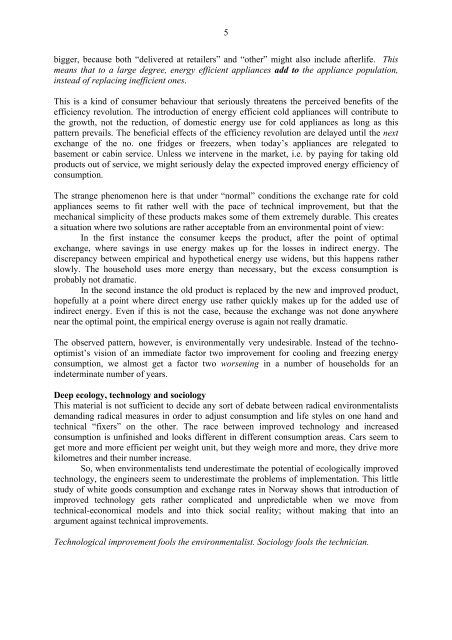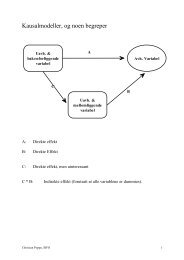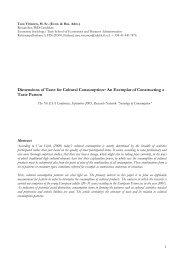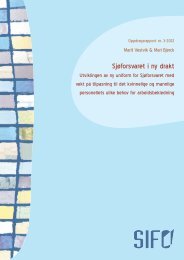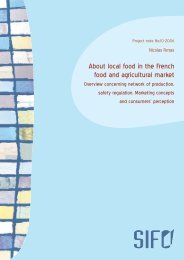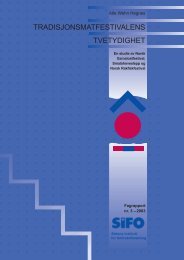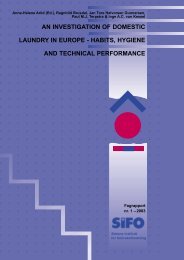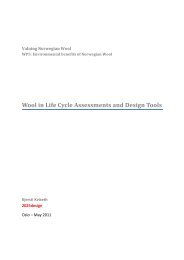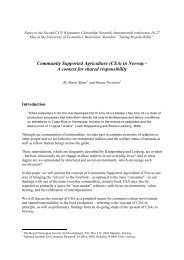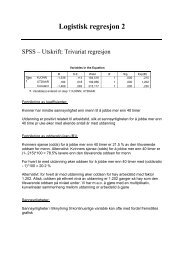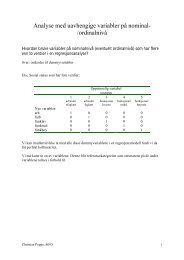Social Constraints to Eco Efficiency: Refrigerators and freezers - SIFO
Social Constraints to Eco Efficiency: Refrigerators and freezers - SIFO
Social Constraints to Eco Efficiency: Refrigerators and freezers - SIFO
Create successful ePaper yourself
Turn your PDF publications into a flip-book with our unique Google optimized e-Paper software.
5bigger, because both “delivered at retailers” <strong>and</strong> “other” might also include afterlife. Thismeans that <strong>to</strong> a large degree, energy efficient appliances add <strong>to</strong> the appliance population,instead of replacing inefficient ones.This is a kind of consumer behaviour that seriously threatens the perceived benefits of theefficiency revolution. The introduction of energy efficient cold appliances will contribute <strong>to</strong>the growth, not the reduction, of domestic energy use for cold appliances as long as thispattern prevails. The beneficial effects of the efficiency revolution are delayed until the nextexchange of the no. one fridges or <strong>freezers</strong>, when <strong>to</strong>day’s appliances are relegated <strong>to</strong>basement or cabin service. Unless we intervene in the market, i.e. by paying for taking oldproducts out of service, we might seriously delay the expected improved energy efficiency ofconsumption.The strange phenomenon here is that under “normal” conditions the exchange rate for coldappliances seems <strong>to</strong> fit rather well with the pace of technical improvement, but that themechanical simplicity of these products makes some of them extremely durable. This createsa situation where two solutions are rather acceptable from an environmental point of view:In the first instance the consumer keeps the product, after the point of optimalexchange, where savings in use energy makes up for the losses in indirect energy. Thediscrepancy between empirical <strong>and</strong> hypothetical energy use widens, but this happens ratherslowly. The household uses more energy than necessary, but the excess consumption isprobably not dramatic.In the second instance the old product is replaced by the new <strong>and</strong> improved product,hopefully at a point where direct energy use rather quickly makes up for the added use ofindirect energy. Even if this is not the case, because the exchange was not done anywherenear the optimal point, the empirical energy overuse is again not really dramatic.The observed pattern, however, is environmentally very undesirable. Instead of the technooptimist’svision of an immediate fac<strong>to</strong>r two improvement for cooling <strong>and</strong> freezing energyconsumption, we almost get a fac<strong>to</strong>r two worsening in a number of households for anindeterminate number of years.Deep ecology, technology <strong>and</strong> sociologyThis material is not sufficient <strong>to</strong> decide any sort of debate between radical environmentalistsdem<strong>and</strong>ing radical measures in order <strong>to</strong> adjust consumption <strong>and</strong> life styles on one h<strong>and</strong> <strong>and</strong>technical “fixers” on the other. The race between improved technology <strong>and</strong> increasedconsumption is unfinished <strong>and</strong> looks different in different consumption areas. Cars seem <strong>to</strong>get more <strong>and</strong> more efficient per weight unit, but they weigh more <strong>and</strong> more, they drive morekilometres <strong>and</strong> their number increase.So, when environmentalists tend underestimate the potential of ecologically improvedtechnology, the engineers seem <strong>to</strong> underestimate the problems of implementation. This littlestudy of white goods consumption <strong>and</strong> exchange rates in Norway shows that introduction ofimproved technology gets rather complicated <strong>and</strong> unpredictable when we move fromtechnical-economical models <strong>and</strong> in<strong>to</strong> thick social reality; without making that in<strong>to</strong> anargument against technical improvements.Technological improvement fools the environmentalist. Sociology fools the technician.


